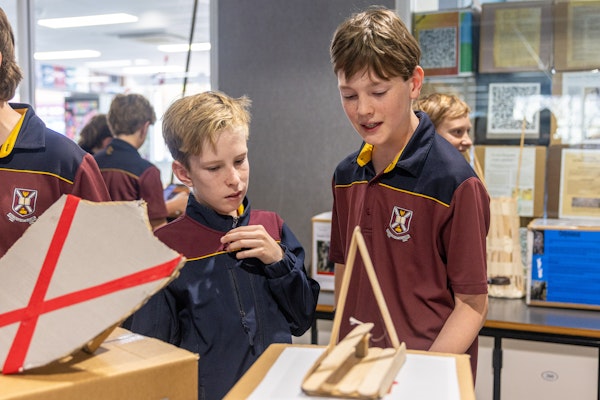
Fostering global citizens: the value of an interdisciplinary approach in education
As boys and young men encounter the world around them, they draw on and connect learning from across areas of knowledge. Interdisciplinary Learning aims to capture these connections.
Through Interdisciplinary Learning (IDL), students learn to harness what they have learnt across different subjects, and to integrate their learning to build new understandings and answer complex problems.
So, what are the benefits of
Interdisciplinary Learning?
IDL challenges students to look beyond pre-existing notions by integrating information from different perspectives. Students use these varied viewpoints to analyse situations more comprehensively.
Studies show that interdisciplinary instruction enhances students' cognitive skills, helping them identify bias, apply critical thinking, handle uncertainty, and recognise and value ethical issues.1
IDL allows students to tackle problems with innovative solutions.2 IB programmes like the MYP and DP support this approach. This style of learning helps students develop higher-order thinking and problem-solving skills.3
For instance, Year 6 and 7 IDU Week encourages students to integrate concepts from subjects such as Science and Maths or English and Humanities. This integration fosters a deeper understanding and a more nuanced approach to problem-solving.4
IDL helps students appreciate and identify the interconnectedness of real-world issues by integrating different perspectives.5
As part of the IB Diploma Programme, students complete the 'Theory of Knowledge' (TOK) course. This course challenges students to investigate and understand information from various disciplinary perspectives. Rather than focusing on a single subject, students analyse critical reflections on real-world situations and think conceptually about how humans learn. By looking at the methods by which knowledge is produced, it equips students to consider the factors that shape knowledge and challenge its reliability.
This approach prepares students to tackle complex global issues, such as sustainability and ethical considerations, by applying interdisciplinary knowledge to real-world problems.6

Interdisciplinary Learning at Scotch
What are the benefits of Interdisciplinary Learning (IDL), and why do we continue to implement it? IDL sits at the heart of the International Baccalaureate (IB) programmes offered here at Scotch College Perth.
At Scotch, we proudly offer the IB programme across Junior, Middle, and Senior Schools. Each programme designed to spark curiosity and foster a love of learning.
The IB framework emphasises a question-oriented approach while focusing on skill development, based on the latest educational research.
By teaching IDL, we equip our students with critical thinking, problem-solving, and real-world application skills, helping them become positive and influential global citizens.
At Scotch, we embrace education in all its breadth and diversity. Our education inspires excellence and instils skills, resilience, and empathy that prepare boys for life.
International Baccalaureate Programmes
at Scotch College
The PYP serves students aged 5 to 12 and focuses on developing the whole child, both in the classroom and beyond.
The MYP caters to students aged 11 to 14 and combines academic challenge with life skills, going beyond traditional school subjects.
Students aged 16 to 19 can undertake the Diploma. This two-year curriculum offers a qualification that leading universities worldwide recognise. Learn more about the IB Diploma.
1. Repko, A. F. (2009). Interdisciplinary Research: Process and Theory. SAGE Publications.
2. Beane, J. A. (1997). Curriculum Integration: Designing the Core of Democratic Education. Teachers College Press.
3. Hubert, C. (2021). Interdisciplinary learning and the effects on students.
4. International Baccalaureate. (2014). Middle Years Programme: From Principles into Practice. International Baccalaureate Organization.
5. Jacobs, H. H. (1989). Interdisciplinary Curriculum: Design and Implementation. ASCD.
6. International Baccalaureate. (2015). Theory of Knowledge Guide. International Baccalaureate Organization.

